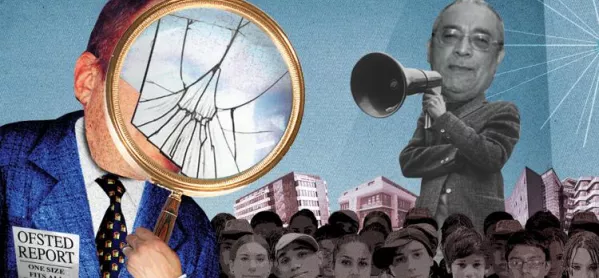The chief inspector’s remarks about workload and Sats preparation, made on LBC Radio yesterday, are very welcome and long overdue.
Ofsted has contributed massively to workload issues, and it’s good that this is being recognised at long last. Similarly, the attempts by Sean Harford, Ofsted’s national director of education, at myth-busting are helpful and well-intentioned, even if not yet fully accepted by many schools and teachers. Ofsted needs to ask itself why such myths persist. As a priority, the chief inspector needs to ask herself why inspection is viewed the way it is.
The answer is a very uncomfortable and one which Ofsted has failed utterly to understand.
There is a deep and profoundly disturbing issue which has never been properly acknowledged. Inspection, as it has been conducted under a succession of Ofsted regimes, is not just anxiety-producing; it is felt by many, if not all, teachers as an existential threat.
This is easy to say, but how best to articulate it?
‘I am what, and how, I teach’
Here’s my attempt, as I try to explain what’s in the mind of a teacher expecting to be observed as part of an inspection, even though she or he may have been assured that her or his lesson is not being graded:
“I’m not just nervous at the prospect of being inspected, I’m viscerally scared. I may not have shown it at home or in the staffroom or with the governors, and I hope I don’t show it to the children. But, I wonder if you, the inspector, have any idea of how I feel. Hopefully, hopefully, you do but...
“I wonder what sort of person you are. Do you view things half-full or half-empty? Are you coming in with a supportive or with a critical mind-set? Are you going to judge me by comparing me to supposedly “outstanding” teachers, or are you going to be reasonable and appreciate we can’t all be super-human?
“But then, have you really been a full-time teacher? If so, you must have had bad lessons, as well as good ones. Can you remember what it’s really like teaching day in, day out - trying to do the best for the children but knowing you don’t, or can’t, always succeed? Perhaps I won’t in this lesson - who knows?
”There are so many things that aren’t under my control, including my nerves.
There are so many things that could go wrong in the lesson. I can’t guarantee anyone’s actions and reactions, my own and yours included. The unpredictability that makes teaching fascinating is so hard to bear under the cold scrutiny of inspection. The spontaneity which makes a lesson come alive cannot be planned for, cannot be ensured - it seems to just happen or not. And actually, it is more likely not to, given the forced, unreal atmosphere created in part by the presence of you, ‘The Other’.
“Can you understand that?
”Teaching is so incredibly uncertain. I think I can judge if the lesson is going well, if the children are learning, if they are absorbed, if there is a ‘buzz’ in the classroom, but my feelings and judgements are fallible, especially in this stressful situation. Aren’t yours?
“I’m giving so much of myself in the lesson, I’m putting so much of myself on the line. I am what, and how, I teach. It’s not just that my job may be at risk if things go badly, it’s that my integrity as a teacher and as a person is under threat. If, in your judgement, I teach badly, what does that say about me? I will remember what you say for the rest of my life. Your words will weigh so very heavily.
“Please choose them carefully.”
Choose your words carefully, Ofsted
In her most recent remarks, the chief inspector is mistaken about her priorities. Though very important, reducing teacher workload should not be her top priority. Instead, she should be combatting the visceral fear of inspection that is an essential part of teachers’ reality, and that means combatting accountability (and, with it, inspection) as they are currently conceived. She will need to choose her words very carefully.
Colin Richards is a former primary school teacher, university professor and HMI
Want to keep up with the latest education news and opinion? Follow Tes on Twitter and like Tes on Facebook




